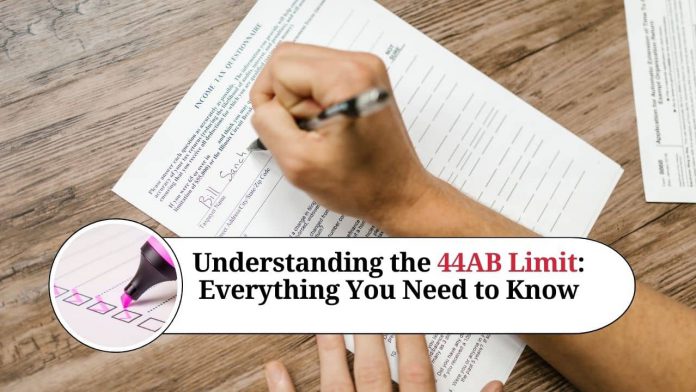Introduction The Indian Income Tax Act of 1961 requires taxpayers to maintain proper accounting records and submit tax returns. Additionally, certain taxpayers are required to have their accounts audited by a Chartered Accountant (CA) and file an audit report with their tax return. This requirement is specified under section 44AB of the Income Tax Act, 1961.
Applicability of Section 44AB Section 44AB applies to the following taxpayers:
- Individuals or Hindu Undivided Families (HUFs) with a turnover of Rs. 1 crore or more in the previous year
- Businesses with gross receipts or turnover of Rs. 1 crore or more in the previous year
- Professionals with gross receipts of Rs. 50 lakhs or more in the previous year
Types of Audits Under Section 44AB There are two types of audits that can be conducted under Section 44AB:
- Statutory Audit: This audit is conducted by a CA appointed by the taxpayer to ensure compliance with accounting and auditing standards, as well as the requirements of the Income Tax Act. The auditor will also provide an audit report, which must be filed with the tax return.
- Tax Audit: This audit is conducted by a CA appointed by the Income Tax Department. The purpose of this audit is to verify the taxpayer’s compliance with the Income Tax Act, including the accuracy of the tax return and the deductions claimed. The auditor will provide an audit report, which must be filed with the tax return.
Due Date for Filing Tax Audit Report
The due date for filing the tax audit report is September 30th of the assessment year. For example, if the tax year is 2022-23, the due date for filing the tax audit report is September 30th, 2023. However, if the taxpayer is required to submit a transfer pricing report, the due date for filing the tax audit report is November 30th of the assessment year.
Consequences of Non-Compliance Non-compliance with Section 44AB can result in penalties and other consequences, including:
- A penalty of 0.5% of the total sales, turnover, or gross receipts, subject to a maximum of Rs. 1,50,000, if the taxpayer fails to get the accounts audited or fails to furnish the audit report.
- A penalty of Rs. 1,50,000 or 0.5% of the total sales, turnover, or gross receipts, whichever is less, if the taxpayer fails to maintain proper accounting records.
- In case of a delay in filing the tax audit report, the taxpayer may be subject to interest at the rate of 1% per month or part of a month.
Conclusion
Section 44AB of the Income Tax Act is an essential provision that ensures the accuracy and compliance of tax returns filed by taxpayers with a certain level of turnover or gross receipts. It also ensures that proper accounting records are maintained and that any discrepancies are detected and rectified through a statutory or tax audit. Taxpayers should ensure that they comply with the provisions of Section 44AB to avoid penalties and other consequences.
Read more useful content:
Frequently Asked Questions:
Q: What is Section 44AB of the Income Tax Act? A: Section 44AB of the Income Tax Act specifies the provisions related to tax audit of businesses. It applies to individuals, HUFs, partnership firms, LLPs, companies, and other types of taxpayers.
Q: What is the turnover limit for tax audit under Section 44AB? A: For businesses, the turnover limit for tax audit under Section 44AB is Rs. 1 crore. However, for professionals, the turnover limit is Rs. 50 lakh.
Q: What happens if a taxpayer is required to get a tax audit done under Section 44AB but fails to do so? A: If a taxpayer is required to get a tax audit done under Section 44AB but fails to do so, a penalty of 0.5% of the total sales or turnover or gross receipts, subject to a maximum of Rs. 1,50,000, may be levied by the Income Tax Department.
Q: Is it mandatory for all businesses and professionals to get a tax audit done under Section 44AB? A: No, it is not mandatory for all businesses and professionals to get a tax audit done under Section 44AB. Only those taxpayers whose turnover or gross receipts exceed the specified limit are required to get a tax audit done.
Q: Are there any exemptions available under Section 44AB? A: Yes, there are certain exemptions available under Section 44AB. For example, newly set up businesses may be exempt from tax audit for the first year of operation, provided their turnover or gross receipts do not exceed Rs. 5 crore. Similarly, professionals may be exempt from tax audit for the first year of practice, provided their gross receipts do not exceed Rs. 50 lakh.
Q: Can a taxpayer voluntarily opt for a tax audit under Section 44AB even if the turnover or gross receipts do not exceed the specified limit? A: Yes, a taxpayer can voluntarily opt for a tax audit under Section 44AB even if the turnover or gross receipts do not exceed the specified limit.
Q: What are the documents required for a tax audit under Section 44AB? A: The documents required for a tax audit under Section 44AB may include the audited financial statements, audit report, bank statements, invoices, bills, vouchers, and other relevant documents.
Q: Who can conduct a tax audit under Section 44AB? A: A tax audit under Section 44AB can be conducted by a practicing chartered accountant or a practicing cost accountant. The tax audit report must be signed and certified by the auditor.




















